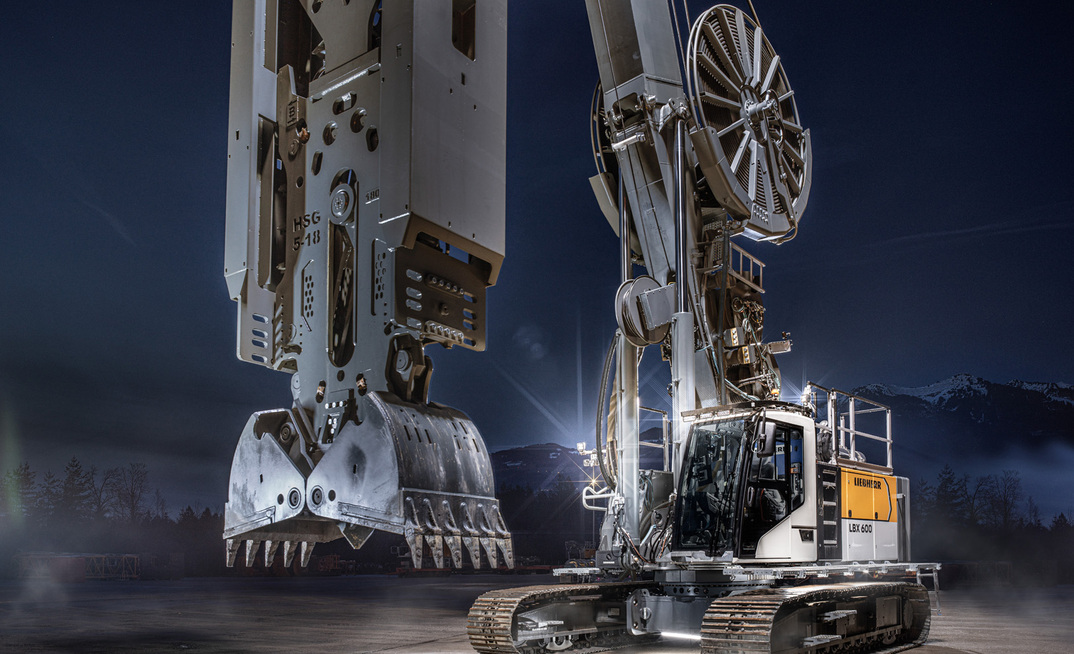With the LBX 600, the new carrier machine for slurry wall construction, Liebherr-Werk Nenzing is responding to the unique challenges faced on urban jobsites. The compact size combined with the unplugged version enables work in even the most confined spaces and noise-sensitive areas.
The LBX 600 can be flexibly equipped and customised to meet site requirements thanks to a modular system with three different booms. The standard version of the machine has a total height of 17.8m. For applications with restricted height, eg working under bridges, the Low Head with 11m or Ultra Low Head with 5.8m can be used. The LBX 600 also has a particularly impressive slim design. The compact basic machine can be transported in one piece as, thanks to the telescopic undercarriage, the track width can be reduced to 3m.
Hydraulic slurry wall grab
The carrier machine is not only designed for work using a hydraulic grab but also with a mechanical grab or chisel, thanks to the two free-fall winches with a line pull of 300kN each. In combination with the HSG 5-18 hydraulic slurry wall grab, the LBX 600 offers very intuitive operation, which also enables hydraulic corrections to the grab alignment and, thus, a higher verticality of the trench.
The hydraulic slurry wall grab is modularly designed and has a highly robust base body. As the names of the grabs imply, HSG 5-18 C and HSG 5-18 L slurry walls with thicknesses between 500 and 1800mm can be installed, depending on the composition. The term "C" (compact) stands for the compact standard design for the Low Head Version of the LBX 600, while the base body of the "L" (large) version is 2.5m longer. The resulting total height of the grab at 9.5m and the high weight with a low centre of gravity provides even better vertical positioning and are especially advantageous when installing larger dimensioned slurry walls.
When working in difficult ground conditions, the execution of the work can be improved by increasing the dead weight of the grab with an additional weight of 4.4t or 6.5t. Bites with lengths of 2500-3400 mm and maximum depths of 80m can be excavated with the grab.
The slurry wall grab is fitted with a hydraulic rotating device, which allows the grab to be aligned in all directions and provides for quick and operator-friendly 180-degree rotation after each grab cycle. The high cylinder force of 1527kN attains an unbeatable performance even under extreme conditions. The fill level indicator on the grab ensures high productivity throughout the entire application. The maximum permissible grab weight - i.e. grab including filling capacity - is 30t.
Unplugged
The LBX 600 is available in both conventional and battery-powered versions, the LBX 600 unplugged. Both versions have identical performance data. One exceptional feature of the unplugged version is zero emissions. It does not produce any exhaust fumes and is extremely quiet. This strikes the right note, especially in noise-sensitive regions and finds favour with jobsite personnel and residents.
 The slim design of the LBX 600 fulfils the requirements of urban jobsites
The slim design of the LBX 600 fulfils the requirements of urban jobsites
The battery is charged using a conventional jobsite electric supply. Operations can continue as normal while charging. To change to battery operation, you just need to pull out the plug, therefore: unplugged. Whether attached to the electric supply or not, the performance and range of application remain unchanged. Liebherr offers the LBX 600 and the LBX 600 unplugged as a complete package with hydraulic slurry wall grab HSG 5-18.
Digital solutions
All working processes for slurry wall construction can be electronically recorded and visualised using the process data recording system PDE. The system is operated and displayed on the PDE touchscreen in the cabin. PDE records operating data from the Litronic control system, as well as data from external sensors.
Using the MyJobsite software solution, all relevant process, machine and jobsite data can be recorded, displayed, analysed, managed, and evaluated in one central location. The collected data can be accessed via a web browser when an internet connection is active. With the recorded PDE data, a working protocol is automatically generated as proof of quality directly after completion of a work process. The parameters of the driving protocol can be defined and assigned in advance, which is a significant time-saver.
The LiDAT data transmission and positioning system enables the fleet management of Liebherr machines. The system supplies information about localisation as well as about the operation of the machines. This includes information on the machine's position, operating and utilisation times, fuel consumption, and service interval.



















